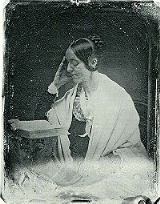
advocate associated with the American transcendentalism
movement. She was the first full-time American female book reviewer in journalism. Her book Woman in the Nineteenth Century is considered the first major feminist
work in the United States.
Born Sarah Margaret Fuller in Cambridge, Massachusetts
, she was given a substantial early education by her father, Timothy Fuller
.
There are noble books but one wants the breath of life sometimes. And I see no divine person. I myself am more divine than any I see — I think that is enough to say about them...![]()
Beware of over-great pleasure in being popular or even beloved.![]()
Put up at the moment of greatest suffering a prayer, not for thy own escape, but for the enfranchisement of some being dear to thee, and the sovereign spirit will accept thy ransom.![]()
It is astonishing what force, purity, and wisdom it requires for a human being to keep clear of falsehoods.![]()
How many persons must there be who cannot worship alone since they are content with so little.![]()
Let no one dare to call another mad who is not himself willing to rank in the same class for every perversion and fault of judgment. Let no one dare aid in punishing another as criminal who is not willing to suffer the penalty due to his own offenses.![]()
The use of criticism, in periodical writing, is to sift, not to stamp a work.![]()

